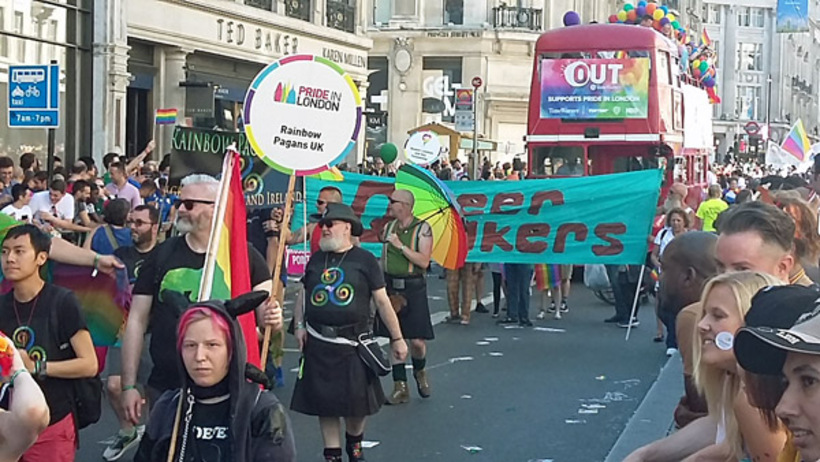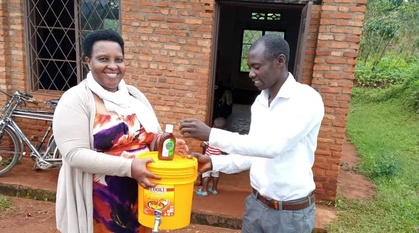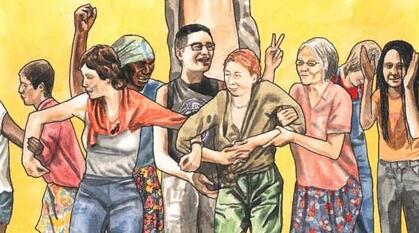A testimony of divine grace: Quakers and same-sex marriage
In 2009 Quakers in Britain affirmed same-sex marriage. Michael Booth looks back at 60 years of Quaker work towards recognising same-sex relationships.

Quakers have always diligently written tracts, pamphlets and books, including those about sexuality. Work to produce Towards a Quaker View of Sex began in 1957, and it was published in 1963. It was the first religious text to positively explore same-sex relationships, stating: “It is the nature and quality of a relationship that matters… The same criteria seem to us to apply whether a relationship is heterosexual or homosexual."
The book helped Quakers become known to those who were looking for a friendly and accepting church. It had other effects on people who were less socially progressive, including Friends.
So, how did lesbians, gay men and others in the LGBTQ+ spectrum (lesbian, gay, bisexual, transgender, queer and others) come to be accepted, loved and nurtured within Britain Yearly Meeting? It has been a long and often difficult journey.
Meetings for commitment
In 1973 a group of Quakers set up the Friends Homosexual Fellowship (now the Quaker Gender & Sexual Diversity Community). The aim was to support individual Quakers and promote dialogue in the wider Quaker community. The involvement of heterosexual Quakers meant that Friends with homophobic feelings could not dismiss the group as 'them' as they could not ignore the fact that some straight Friends supported it too.
In 1980 a respected Friend consulted meetings about attitudes to sexuality. He was shocked by some of the bigotry he encountered, and found many responses difficult to read calmly.
In 1987 Meeting for Sufferings considered same-sex marriage for the first time, stating: “We recognise that many homosexual people play a full part in the life of the Society of Friends. There are homosexual couples who consider themselves to be married and believe that this is as much a testimony of divine grace as a heterosexual marriage. They miss the public recognition of this in a religious ceremony even though this could have no legal significance.
We have found the word 'marriage' difficult but we are clear that we have a responsibility to support all members of our meetings and to uphold them in their relationships… The acceptance of homosexuality distresses some Friends."
Although it had not made a decision, it had encouraged the production of further information about marriage equality issues.
Around the same time, parliament was considering the Local Government Act. It included the infamous clause in Section 28 that a local authority "shall not intentionally promote homosexuality or publish material with the intention of promoting homosexuality" or "promote the teaching in any maintained school of the acceptability of homosexuality as a pretended family relationship". A Friend spoke of how demeaning it felt to have his loving relationship dismissed by the state as a "pretended family relationship."
LGBT+ Friends continued to go about their lives, some living with their partner with all the joys and social worry that brought. Meetings began to recognise that members of their community were not heterosexual, leading some to hold 'meetings for commitment' for same-sex couples. Some meetings found this easy, others did not.
Political changes
In 2005 civil partnerships were introduced. Widespread press coverage of the civil partnership of Elton John and David Furnish described their partnership as a marriage. I suspect this helped the cause of marriage equality. It certainly meant that people became familiar with the term marriage to describe a legal relationship between two women or two men.
In 2007 there was a Quaker consultation on marriage equality. There was broad agreement that same-sex relationships should be commemorated within meetings for worship. Some Friends remarked that just considering such questions had helped them change their opinions. It was felt that Quakers should have new conversations about same-sex marriage.
Formal recognition
At Yearly Meeting 2009 Quakers became the first religious organisation in Britain to formally recognise same-sex marriage. Many Friends spoke about their experience and life stories. The personal stories and contributions moved the meeting considerably, and many have stayed with me.
One Friend spoke about how, if we understand marriage to be the Lord's work, then who are we to judge what the nature of a relationship is? Why would we deny that the relationship between two women or two men could be a marriage?
We realised that we were not asking for work to be done, but that we as a yearly meeting understood marriage to be between two people and God, and gender just didn't come into it. This had been beyond the dreams of so many of us. I was deeply impressed that Friends were open to new light and able to acknowledge how they were moved.
Yearly Meeting's decision got considerable press attention and British Quakers began to work with other churches to explain how our theology (PDF) had taken us on an unexpected but welcome path. Looking at the legal and ecumenical work required, we anticipated 20-30 years of work lay ahead of us. Happily, we were mistaken.
Legislative change
At a 2013 meeting of church groups, many churches were looking to be exempt from same-sex marriage on the grounds of religious freedom. I felt moved to speak, to demonstrate that there was not a single Christian view on the issue of marriage equality.
With a deep breath and quiet inward prayer, I stood up, perhaps feeling like Daniel in the lion's den. I expressed delight that other churches recognised the difference between a marriage and a civil partnership, and reminded them that Quakers had decided that we wished to offer marriages to all couples. Thus we welcomed the bill, and looked forward to holding same-sex weddings.
Much quiet political work continued in the next few years. Same-sex marriages became possible in March 2014 in England and Wales and in December 2014 in Scotland. Northern Ireland has not legalised same-sex marriage.*
On 28 March 2014, my partner and I went to Islington Town Hall to join a crowd to witness and celebrate one of the first same-sex marriages. When they emerged, newly married, there were joyful cheers and tears of joy – it was magical. In these first few months Quaker same-sex weddings took place around the country.
Where are we now?
Britain Yearly Meeting sees marriage as a formal, public, spiritual and legal commitment between two people regardless of gender. The Quaker Gender and Sexual Diversity Community enables Friends of all sexualities and identities to come together.
Friends are still on personal journeys to fully understand how our testimony to equality looks at understandings of gender. Undoubtedly, we will again be challenged and find ourselves going forward in faith and prayer.
[QUOTE-START]
There is no longer male and female; for all of you are one in Christ Jesus
- Galatians 3:28
[QUOTE-END]
In the meantime, Quaker meetings around Britain are celebrating marriages – for same-sex and for opposite-sex couples – with equal joy. How good to look back on this journey and to recognise that now, this equality simply feels normal.


